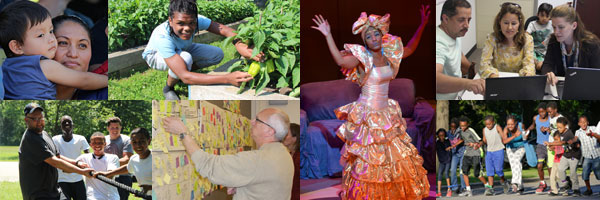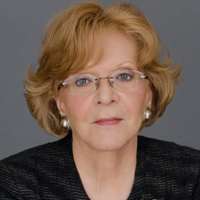Combat veterans pair with youth exposed to violence on a joint mission for healing. A pilot CyberESL program makes it easier to learn English as a second language. Arts organizations and their funders come together to address racial imbalances in the culture sector. Urban agriculture programs provide job training and help to build healthier communities. Seventy neighborhood groups bring people together to hold sports events and block parties, offer free meals and school supplies, provide dance and other performances, conduct peace circles, and other opportunities for police to interact with community residents, building community cohesion and fostering the conditions to help keep families safe over Labor Day weekend and beyond.
In 2016, MacArthur supported these and many others of the hundreds of local nonprofit organizations engaged in creative and effective work to help address often seemingly intractable challenges and to make our hometown a better place to live and work for everyone. Our direct awards in 2016—86 grants and impact investments totaling almost $34 million*—reflect several core commitments across MacArthur’s programs:

Government Accountability
MacArthur joined other local funders to support the independent Police Accountability Task Force and the Grassroots Alliance for Police Accountability, a group of organizations bringing community voices and perspectives to the design of oversight mechanisms for the Chicago Police Department’s policies and practices. We supported The Invisible Institute for its civic efforts to encourage police reform through greater transparency and investigative reporting. And we enabled Cook County to participate in the Safety and Justice Challenge, our national criminal justice reform effort to reduce the overuse and misuse of jails.
Economic Development
Working with the Chicago Community Trust and the Calvert Foundation, we launched Benefit Chicago, an innovative collaboration to mobilize $100 million in financing for financial intermediaries, nonprofits, and social enterprises working throughout the Chicago region to create jobs and expand services, promote economic development and improve the quality of life. And, we supported the Chicago Community Loan Fund to partner with Chicago TREND, which is using sophisticated data and incentives, and tapping into innovative financing, to spur retail development on Chicago’s South and West sides.
Youth Voices
To amplify the voices of young people of color in the public debate, we supported the Black Youth Project at the University of Chicago. The group’s GenForward survey addresses race and criminal justice, LGBT rights, immigration policy, and the economy, all from a youth perspective. We continued our funding for the HIVE Chicago Learning Network and Digital Youth Network, through the Chicago Community Trust and DePaul University respectively, which bring together dozens of organizations, and support their educator leaders, to create connected learning opportunities for local youth.
Civic and Cultural Institutions
Directly and through our partners, the Richard H. Driehaus Foundation and Prince Charitable Trusts, our resources continued to provide crucial support to more than 300 local arts and culture organizations—as they question, entertain, inspire, provoke, challenge, engage, and transport audiences and participants young and old. In addition to their exceptional contributions to the arts, many of these organizations offer programs that invite young Chicagoans to pursue their passions and gain skills in safe environments.
As we took stock of the most important issues faced by the city last year, our staff made a commitment to listen more. Through conversations with more than 100 individuals, including residents and community and civic leaders, we heard deep concern about violence, police brutality, and frustration with the persistent racial and other inequities across the city’s neighborhoods, in schools, and the local justice system, and a lack of opportunities for rewarding work. We heard candid comments about the Foundation and the philanthropic sector in general, including some that made us uncomfortable. I reported on these conversations in my annual letter.
Our work through intermediaries remains an essential tool to leverage additional resources and provide support for smaller organizations, entrepreneurs, and even individual homeowners than we are able to reach directly. Going forward, we will find additional ways to reach even more organizations and programs that work closer to the ground—while helping to ensure that leadership from Chicago’s diverse communities is strong and influential and their organizations effective and sustainable. These insights will help guide our plans for the future.
In my annual letter, I committed us to operating more openly and creatively, listening carefully, taking more risk, focusing on justice, helping support others’ ambitions and talents, and directly taking on the issue of the loss of trust in key systems, all while helping to make real progress on solving urgent problems, using all available means—around the world and here in Chicago.
Building on our historic local support—$1.1 billion for more than 1,300 individuals and organizations, more than to any other place in the world—and reflecting on what we have learned, we will complete and begin to implement a new grantmaking and engagement strategy for Chicago in 2017. I assure you of our continuing concern, energy, and support.
* Does not include grants or impact investments made in 2016 by intermediaries with funds provided by MacArthur in 2016 or in prior years.




